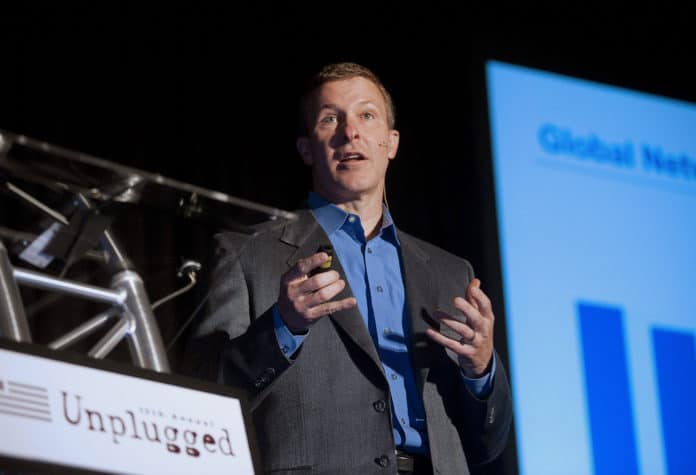The decision by United Airlines to hire a new president away from American Airlines firms up the roster of executives who will contend with fare declines pushing the industry to its worst returns in five years.
Scott Kirby, 49, will join United Continental Holdings Inc. immediately, reporting to Chief Executive Officer Oscar Munoz and overseeing day-to-day functions from operations to network planning. At American Airlines Group, Chief Operating Officer Robert Isom, 52, takes over as president.
The sudden move fills a key void at United, providing a potential successor with deep airline roots to Munoz, 57, a former railroad executive. It ends the more than two-decade partnership of Kirby and American CEO Doug Parker, 54, and costs American the executive overseeing scheduling, revenue management and fare strategy.
“United’s hire of Scott Kirby as president comes as a big surprise and should be a meaningful positive for UAL shares,” Julie Yates, an analyst at Credit Suisse Group AG, wrote in a note to clients. While Isom is a talented executive who may be a better complement to Parker, American may “underperform near-term as investors wrangle with what this means,” she said.
United advanced 5.6 percent to $49.59 at 9:48 a.m. in New York. American fell less than 1 percent to $36.06. A Bloomberg index of U.S. airlines tumbled 19 percent this year through Monday, putting it on track for the largest annual drop since 2011.
The two presidents at American and United assume their new jobs as airlines contend with concerns that the supply of flights and seats is exceeding demand, driving down fares. That’s led to drops in revenue for each seat flown a mile, contributing to the stock-market losses even after lower fuel prices have helped carriers post record profits.
“In 11 days, United completely revamped their C-suite and will now look to unlock the company’s potential,” Helane Becker, a Cowen & Co. analyst, said in a report Tuesday.
Kirby’s new job at United may also position him to become an airline chief executive, an outcome that wasn’t likely to materialize anytime soon at American where CEO Doug Parker, 54, is well-liked by directors. The departure of Kirby, 49, from American comes after a review of succession planning by directors there this summer. American said Monday that, as part of the process, “the company concluded it would not be able to retain its existing executive team in their current roles for an extended period.”
“The most pressing investor questions will stem around American’s ability to replace Mr. Kirby’s contributions to revenue management,” Savanthi Syth, a Raymond James Financial analyst, said in a note. “Encouragingly, Robert Isom has previous revenue management experience” and Don Casey, senior vice president of revenue management “is well-groomed to succeed Mr. Kirby.”
Kirby won’t be leaving American empty-handed. The airline agreed to pay him $3.85 million, representing 24 months of base salary, as well as his short-term incentive bonus and an accelerated vesting of more than 259,000 American shares currently valued at more than $9.34 million.
Kirby was an executive at America West when the carrier merged with US Airways in 2005 and when US Airways combined with American as the latter emerged from bankruptcy reorganization in December 2013.
Isom joined Parker and Kirby at US Airways as chief operating officer in 2007, turning around the carrier’s lagging operations. He’s also worked at American to boost on-time performance, and will continue to oversee the airline’s operations while assuming revenue responsibilities.
While Chicago-based United didn’t discuss succession plans, Kirby brings years of airline experience to the carrier’s efforts to match peers in profitability. Syth upgraded her rating on United to outperform, citing “increased conviction” that United will diminish its margin gap versus peers over the next 12 to 18 months.
“The fact that someone would recruit him and he would accept essentially a lateral move to a competitor is indicative of him being very marketable and willing to go on the prospect he would ultimately become CEO,” Bob Mann, president of consultant R.W. Mann & Co., said.
Former United CEO Jeff Smisek stepped down almost a year ago amid an internal inquiry into the airline’s ties to the former chairman of the Port Authority of New York & New Jersey. This year, two activist hedge funds, Altimeter Capital Management and PAR Capital Management Inc., won seats on the airline’s board after mounting a proxy dispute.
Munoz, who suffered a heart attack shortly after becoming CEO and underwent a heart transplant in January, has been reshaping the airline’s executive ranks since returning from a leave of absence. He called the appointment the “culmination of the formation of my leadership team” in a letter to employees.
Cowen’s Becker said Kirby “was unlikely to succeed Doug Parker as CEO anytime soon. Given concerns over Mr. Munoz’s health, the potential for Mr. Kirby to eventually be his successor is a real one.”






